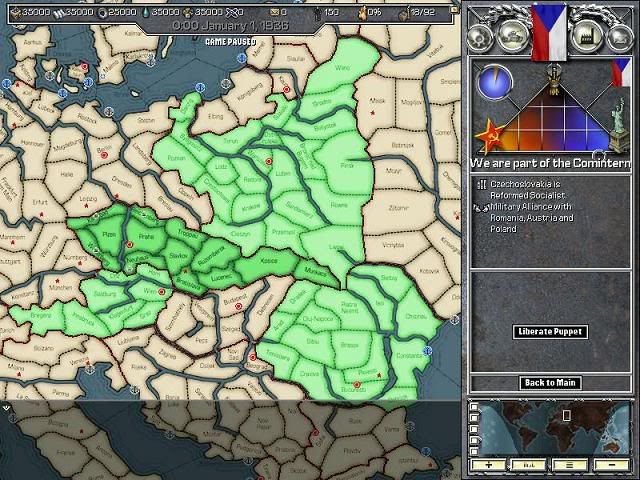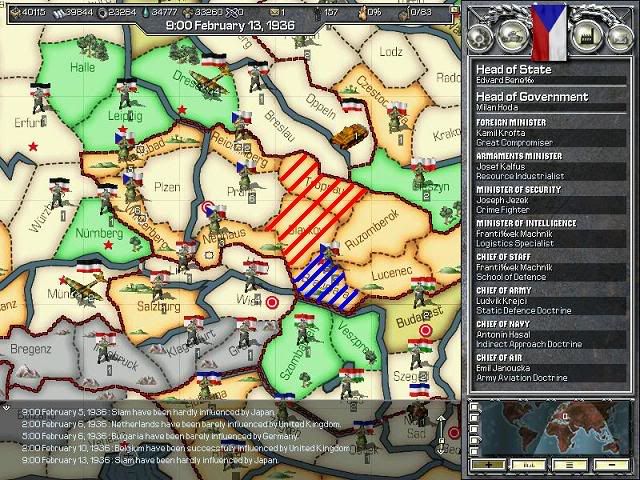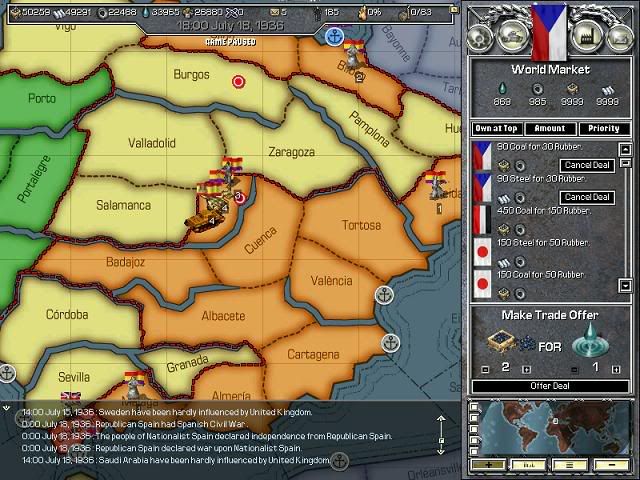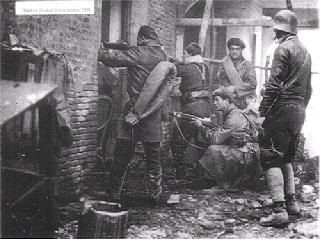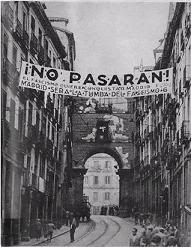Part I: Preparations
The First Preparations
January 3rd 1936, Prague
The only sound echoing in the plush room was the incessant
tick tock of a grandfather clock that sat in the corner. The room wasn't empty; on the contrary, it was filled with government ministers and military officers. Over a dozen men, all sitting quietly. The previous two weeks of celebration had been an inconvinence to the men sitting in the room. Anxiety about what they had done had grown with each passing day. It had happened all too quickly in the last days of December - war in Ethiopia, half-hearted British and French protests, another wave of Nazi and
Heimwehr protests in Vienna, the catalysts for the most stunning diplomatic move of the decade.
The door to the office opened and Edvard Benes, President of the Czechoslovak Republic, entered. It was Benes, former Foreign Minister before recently taking over the presidency after Tomas Masaryk's retirement, who had radically altered the situation in Eastern Europe. The alliance between Poland, Austria, Romania, and Czechoslovakia had been Benes' brainchild. It had also been a major shift from his traditional policy of distancing the country from the rest of Eastern Europe and concentrating on the West, specifically France and Great Britain.
"Good morning gentlemen," the President said in a conversational tone, "I hope you found the last few weeks relaxing." The former silent men erupted in a hurricane of words.
"Mister President..."
"...protests from Berlin and Moscow, even some questioning from Rome and Paris..."
"...the military is in shock, all our defensive strategies have been invalidated..."
"...concerns from Czechs in Tesin and rioting by the Poles, we still have a border dispute with Warsaw after all..."
"...the German delegates in the National Assembly, even the Social Democrats, say they'll refuse to sit at the next session..."
Edvard Benes held up his hand. "Please gentlemen, let us act like civilized men."
The flurry of opinions ceased. The ministers looked at one another briefly. By silent acclaim, the Prime Minister, Milan Hodza, took centerstage to address the President.
"Edvard, you must understand. The world has turned upside down in only a few days. We find ourselves at the head of an alliance that is already fracturing after a mere few weeks. Our border dispute with the Poles continues. Antonin Svehla and the Agrarians aren't happy with Kurt von Schuschnigg's dictatorship in Austria and they certainly aren't happy with the fact that our soldiers will now be responsible for his safety. Ivan Derer and the Slovaks are...well, angry isn't strong enough a word...with our proposal to Hungary. They are well aware of Hungarian designs on their territory."
"Quite true, my friend, very true in fact. The alliance, our Little Entente, is certainly unstable. But the Third Reich as a neighbor is far more unstable. Our nation is populated by millions of ethnic Germans, as is Poland. We are viable targets for Berlin and we can longer depend on Italy or France or Britain as a protector...only ourselves."
None of the men in the room spoke in favor of the new alliance, but none were attacking it anymore.
It will do for now, Edvard thought to himself,
they will come around in time.
"On that note, let us address our new course of action. Field Marshal Machnik, you mentioned that our plans are now obsolete."
The officer nodded. "Yes sir, our major plans addressed Germany or Hungary as the enemy, but, even so, they didn't take into account Polish or Austrian assistance. It also fails to take into account our increased responsibilities."
"Responsibilities?" Hodza questioned. "I thought we had allies now."
"True, but war between us and Germany will now involve Austria and Poland. If the Germans make deep advances into Austrian or Polish territory, Slovakia would be wide open to invasion." Machnik replied.
Kamil Krofta, the Foreign Minister, spoke up. "Also, as the clear head of this alliance, we must also make some significant military contributions."
"Mr. President, the nation isn't ready for rearmament. The Depression has done too much damage to the economy. We all know that and the Social Democrats in the Assembly know it too."
Benes nodded at Josef Kalfus, his Economic Minister. "I have no intention of expanding the army just yet. Maybe in a few years, but not now. Rather, defense shall be our
modus operandi. General Krejci, perhaps you'd like to brief us on your plans to expand the Sudeten Line?"
--------------------------------
February 1936, Outside the city of Krnov, on the German-Czechoslovak Border
The sound of the heavy machinery was overwhelming to Antonin Svehla as he navigated the rough terrain that would soon become an extension of the already impressive Sudeten Line. The young Army Lieutenant was carefully explaining the features of the new defense line while Svehla was ignoring him and carefully watching where he walked. Barbed wire, half-dug trenches, and the remains of boxes of all shapes littered the frost-covered ground. It was an undignified position for the head of the Republican Party of Farmers and Peasants, the largest party in the National Assembly, but Svehla paid the thought no mind.
"And the activity is continuing at the same pace throughout the region, Lieutenant?"
"Yes sir. In the autumn, we'll start work in Bratislava at the same speed. Cold, rain, or hail, the work will continue. General Krejci's efforts have helped shorten the expected completion date significantly." The Lieutenant then continued with his speech, walking past a group of workers using pick-axes to break through the frozen ground.
Regions of Fort Construction
Regions of Potential/Proposed Fort Construction
--------------------------------
June 1936, Prague
Field Marshal Machnik walked through the halls of the War Ministry after his working lunch with the President and the Foreign Minister. Plans for joint exercises between Czech and Polish forces were progressing rapidly. The first multi-national operation for the Little Entente should be underway by September. With his thoughts on the exercise, Machnik continued down the hall, rather than walking up the stairs towards his office. General Krejci was in the middle of a war game with Lieutenant General Koutnak. The two men were going to take part in the joint exercise and the Field Marshal decided that, with the operation now a certainty, it would be best to examine the two generals in action.
As he entered the room overlooking the massive map of Eastern Europe, the Field Marshal expected to see a flurry of activity as Koutnak's German force advanced against Krejci's Entente. Instead, the map room was empty. Machnik walked to the window to examine the situation below. A long line of red pins, representing the
Wehrmacht, stretched deep into Polish and Austrian territory, approaching Warsaw and Vienna. Blue pins, the Czech army, either lay static on the Sudeten Line or were surrounded on the Polish frontier.
The door to the observing room opened and an excited Koutnak and a dejected Krejci entered.
"I see the exercise is over." Machnik commented.
"Yes sir." Krejci said. "I regret to inform you that most of our army has been defeated in the field of battle."
"Your secret, General Koutnak?"
"I massed my forces entirely on the Polish border, sir, and drove deep into enemy territory. The bulk of the Polish and Czech forces were surrounded, allowing spearheads to drive toward Warsaw. Without Czech support, the Austrian army simply collapsed and Vienna is now threatened."
"What my esteemed collegue fails to mention," Krejci replied, "is that western Germany and East Prussia were left almost defenseless. As you notice, Prussia fell to Polish forces and a French offensive could overrun the Ruhr without finding significant resistance."
"I was acting under the assumption that the French and British wouldn't respond." More than a bit of betrayal and anger escaped into Koutnak's words; the lack of Anglo-French actions against Italy and Germany had not been forgotten.
"Perhaps a valid assumption, perhaps not." Machnik stated.
--------------------------------
July 18th 1936, Prague
Kamil Krofta slipped on his jacket as he prepared to leave the office. It had been a long night, putting the finishing touches on diplomatic framework for the Czech-Polish-Romanian joint military exercise in late September.
"Mr. Krofta" came the shrill voice from a young aide as he burst into the room. "The military attache in Madrid is on the phone, he demands to speak with you."
Krofta, angered by his aide's rude interruption as he was about to leave, let a trace of menace enter his voice. "Tell him to call Machnik." The
or else was left out, but was obvious to the young clerk.
"Sir, he says it's important and he doesn't know how long he can stay on the line."
Call the Foreign Minister and say you can't stay on the line!?!? The minister's anger was overflowing now.
"Put him on. He'll have fun serving the rest of his career on the top of the highest mountain I can find."
Krofta sat in his chair and picked up the phone. "Yes?" He was greeted by a burst of static, but it cleared in moment. The minister, a veteran of the Great War, thought he could make out the crash of artillery fire and the long
brappp of machine gun fire.
"Sir! There's fighting in the streets all over Madrid. The ambassadorial district took a few hits and our ambassador's been wounded..." another burst of static came over the line.
"Thank you for the information Captain." Krofta replied, all his anger gone. "I'll inform the President of the
coup immediately."
"This is no
coup, it's civil war." The line went dead.
--------------------------------
Tomorrow (or Thursday depending on my schedule): the Spanish Civil War, don't worry, there will be more action and more screenshots.
